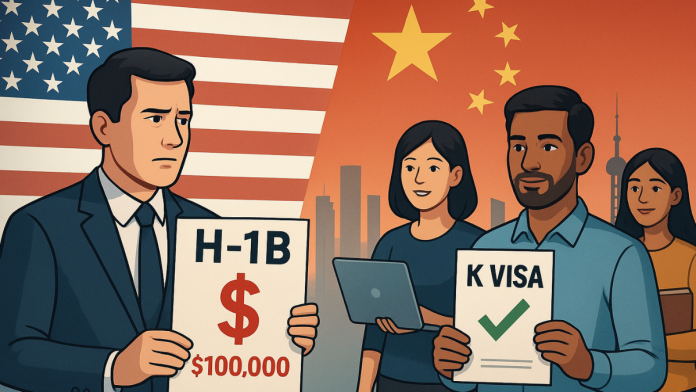China has officially launched a brand-new visa category called the K visa, which will be available from October 1, 2025. This major change was approved in August by the Chinese State Council under Order No. 814. With this, the total number of regular visa types in the country rises to 13.
The K visa has been introduced at a time when the United States, under President Donald Trump, has raised the cost of the H-1B visa to USD 100,000. This sharp rise has left thousands of skilled workers, especially from India and South Asia, feeling uncertain about their future. For many years, the US H-1B visa has been one of the most popular routes for technology and research professionals. But the higher fees and strict new rules have made it harder for young talent to enter the American job market.
China is using this moment to attract those very professionals by offering a competitive and more affordable option. According to the government, the aim of the K visa is to boost global cooperation in science and technology. Officials have stated that China’s growth depends on welcoming international talent and, in return, it will provide opportunities for study, research, and career advancement.
Official data from the Chinese Ministry of Public Security shows that international travel to and from China is already rising sharply. In the first half of 2025 alone, there were 38.05 million international trips, which is 30.2% higher than the same period last year. The K visa is expected to add more momentum to this growing movement of people and ideas.
H-1B visa applicants will now face a $100,000 fee under new policy
Key Benefits and Flexibility of the K Visa
Unlike most existing Chinese work visas, the K visa does not require sponsorship or an invitation from a local employer. This makes the process simpler for applicants, especially those who are just beginning their careers or want to explore opportunities independently.
The visa also offers multiple entries, longer validity, and flexibility. Holders will be able to take part in a wide range of activities such as academic research, teaching, cultural programs, entrepreneurship, and business projects. This broader scope is designed to make the visa more appealing to skilled workers from around the world, including young professionals who might otherwise have chosen the US.
China has also been steadily expanding its visa-free and mutual entry policies. Currently, 75 countries have agreements with China that allow easier entry, and citizens of 55 nations can enjoy up to 240 hours of visa-free transit. The K visa fits into this larger plan of making China a global hub for innovation and knowledge exchange.
🇺🇸 Visa trap alert — US embassy warns Indians: “Don’t confuse expiry date with I-94 deadline
Who Can Apply for the K Visa
The eligibility criteria for the K visa focus on education and professional background. Applicants must meet the following requirements set by the Ministry of Justice:
- Hold at least a bachelor’s degree in STEM subjects (Science, Technology, Engineering, or Mathematics).
- Be graduates from top-ranked universities or research institutions in China or abroad.
- Be early-stage professionals involved in teaching or research in STEM-related areas.
- Meet specific age and professional experience limits set by authorities.
- Provide supporting documents that prove their education and professional activities.
This means the visa is especially targeted toward young scientists, engineers, researchers, and IT professionals who are eager to explore new opportunities.
For Indian workers in particular, the timing is crucial. Many who were preparing to go to the US now face the reality of paying huge fees for the H-1B. China’s K visa offers them a lower-cost, simplified, and more open pathway to continue their careers abroad.
While the K visa may not yet carry the same prestige as American or European routes, it represents a major step in Beijing’s effort to attract international talent and place itself at the center of global scientific collaboration.
